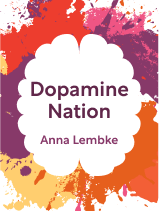

This article is an excerpt from the Shortform book guide to "Dopamine Nation" by Anna Lembke. Shortform has the world's best summaries and analyses of books you should be reading.
Like this article? Sign up for a free trial here.
What is the psychology behind toxic behavioral patterns? How can accepting your patterns lead to change and healing?
In her book Dopamine Nation, Stanford University psychiatrist and addiction treatment expert Anna Lembke explains why you develop unwanted behavioral patterns, the psychology of self-awareness, and how to take back control of your life. According to her, acceptance and self-honesty lead to healing.
Read on to learn more about behavioral patterns in psychology and how to change them, according to Lembke.
Accepting Unwanted Behavioral Patterns
Author Anna Lembke names difficulty in accurately recognizing and accepting your patterns of behavior as an emotional obstacle to making positive changes in your life. Often, it’s hard to see how your behaviors fit together in a pattern. According to Lembke, unwanted behavior patterns psychologically relate with the eroded link between the reward pathways and the logic center of the brain.
When you repeatedly pursue short-term and emotionally driven rewards, you decrease the connectivity between your reward pathways and your prefrontal cortex—the part of your brain responsible for long-term planning. In psychology, behavioral patterns are connected to your prefrontal cortex because it narrates your experiences in real time and keeps you aware of your behaviors, which plays an essential role in self-awareness. The less internal running commentary you have on your daily actions, the less aware you are of your behavior.
Furthermore, even if you are aware of your behavior and recognize the extent of your patterns of overindulgence, it can be difficult to accept that you have a problem. According to psychology, most people don’t want to see themselves as lacking self-control and maintain their positive self-image by minimizing, ignoring, or discounting their behavioral patterns.
| Identifying the Severity of Unwanted Behavioral Patterns Lembke writes that the difficulty in recognizing your patterns of behavior lies largely with a lack of self-awareness or unwillingness to acknowledge the pattern. A good place to start gaining clarity about your behavior or acknowledging the existence of a pattern may be comparing your behavior to standards used by psychologists to diagnose addiction. Psychologists see addiction as a process with three sequential stages. As you read, consider whether any of these sound familiar. 1. Misuse: Someone misuses a pleasurable activity when they are using it to alleviate or distract from emotional or physical pain. Pay close attention to why you are indulging in your high-dopamine activity. For example, are you having an alcoholic drink to have fun with your friends or because you had a hard day at work? 2. Abuse: This stage is characterized by heavier overindulgence to maintain the pain alleviation effects. You may be at this stage if you notice that you’ve built up a tolerance to your pleasurable activity. Are you engaging in the activity for longer periods than you used to, or ingesting higher doses of a substance? 3. Addiction: A repetitive cycle of abuse becomes a full-blown addiction once someone begins putting great effort into accessing their pleasurable activity. They also begin to suffer the consequences of their overindulgence in their relationships, mental health, and financial well-being. To understand if you’ve reached this stage, ask yourself two questions. How did you respond the last time you weren’t able to access your pleasurable activity? Secondly, what has pursuing this activity cost you (financially, emotionally, and socially)? |
Practicing Self-Honesty to Heal
Based on psychology, Lembke argues that to recognize and accept your behavioral patterns, you must make a practice of telling the truth. By this, she means committing to honesty—even when it feels painful, uncomfortable, or shameful. Practicing self-honesty offers four distinct benefits in changing your unwanted behavioral patterns.
1. Recognition. By honestly calling your behavior to your attention, it will be easier to see your patterns of compulsive consumption as they really are. The more you commit to acknowledging each instance of indulgence, the more you will perceive that they are part of a pattern and not just isolated incidents.
(Shortform note: Lembke writes that practicing greater honesty highlights behavioral patterns, but this may not be enough: Recognizing patterns of behavior may also require a strong memory or record of your ongoing behaviors. In The Bullet Journal Method, Ryder Carroll asserts that keeping a log of your daily activities will help you better remember your behaviors, their frequency, and their context—creating new opportunities for self-reflection when your own memory may fall short.)
2. Strengthening the mind. By honestly acknowledging your behavior, you will gradually reforge the linkage between your prefrontal cortex and your reward pathways. As your brain gets used to paying more attention to your decisions, it will naturally rewire itself to make this practice easier. This increased connectivity will then allow you to be more mindful and make better decisions when facing an opportunity to indulge.
(Shortform note: Lembke writes that you can strengthen your prefrontal cortex by practice—the more you use it, the stronger it gets. But this may not be the only way. Neuroscience has shown you can also strengthen your prefrontal cortex through mindfulness activities that don’t necessarily require you to honestly assess yourself. In The Willpower Instinct, Kelly McGonigal writes that a daily mindfulness practice like meditation increases blood flow to the prefrontal cortex. Additionally, people who meditate regularly have been shown to have more gray matter in their prefrontal cortex. When trying to break your pattern of overindulgence, consider making mindfulness a part of your daily routine.)
3. Accountability. According to psychology, practicing self-honesty gives you a greater ability to take responsibility for your behavioral patterns. By admitting when your decisions lead to overindulgence, you can find opportunities to interrupt the cycle. Lembke writes that an honest account of your own behavior is the first step toward taking control of your decisions.
4. Agency. The final benefit of self-honesty is an improved sense of agency. As you recognize your own role in your overindulgence, you will see that you have the power to change it. People who see themselves as the ones making decisions and leading their own lives often have greater faith in their capacity to change.
Lembke writes that one of the most important ways to strengthen your agency is to be aware of how you tell your life story. People who tell stories that focus only on what has happened to them, while overlooking their own decisions, may have a limited sense of their own capabilities. On the other hand, people who tell life stories that emphasize their own choices tend to see themselves as having more control over their future choices. This gives them a greater ability to exercise that control and change their toxic behavioral patterns.
| A Better Way to Tell Your Life Story Lembke writes that telling your life story honestly and with a focus on your own agency will provide a sense of empowerment and accountability to overcome unwanted behavioral patterns. But how can you go about changing the way you tell your life story? Psychologists offer three tips. 1. Avoid binary or absolute language. Phrases like, “There was nothing I could do,” or, “It’s impossible to fix this” create a story where you are powerless. This language not only frames you as having less agency, but it also undermines your accountability for your own actions by rendering the situation as something out of your hands. 2. Use simple and direct language to approach difficult subjects. You don’t need to approach your most sensitive topics with strong judgments and opinions. Simple and direct language will make it easier to lower the emotional barriers to acknowledging painful or difficult truths. For example, instead of saying, “I made the stupid decision to try a cigarette when I was younger and idiotic,” simply say, “I decided to try a cigarette when I was 20.” 3. Think about the life story you would like to have. Reflecting on your greater narrative arc can help inspire you to tell a new story. Is it a story of growth, resilience, and healing? Or is it a story of frustration and despair? |

———End of Preview———
Like what you just read? Read the rest of the world's best book summary and analysis of Anna Lembke's "Dopamine Nation" at Shortform.
Here's what you'll find in our full Dopamine Nation summary:
- What causes addictive behaviors and how to take back control
- How pleasure and pain motivate you to consume
- Strategies for keeping your brain’s natural chemicals in balance






